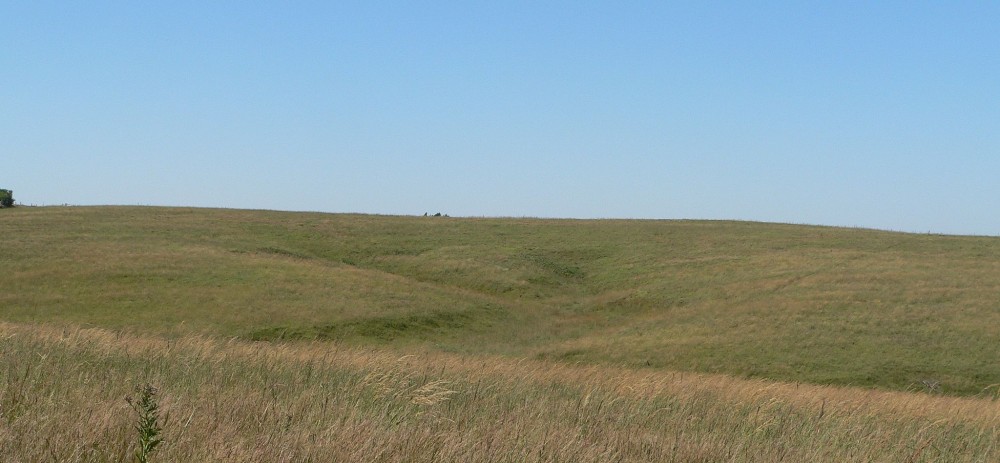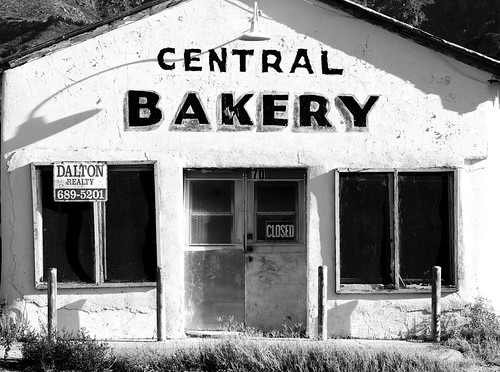One warm night four children stood in front of a bakery. No one knew them. No one, no thing, was yet pursuing them. No one knew where they had come from.
The baker’s wife saw them first, as they stood looking in at the window of her store. No one yet knew what was ahead. And all was quiet and unafraid. At least for now.
The little boy was looking at the cakes, the big boy was looking at the loaves of bread, and the two girls were looking at the cookies.
“Main Street #2” by Kevin Dooley is licensed under CC BY 2.0
Now the baker’s wife did not like the children. But at least she was among the living. She did not like the boys at all. So she came to the front of the bakery and listened, looking very cross.
“The cake is good, Jessie,” the little boy said. He was about five years old.
“Yes, Benny,” said the big girl, who was more than a little world weary. “But bread is better for you. It helps keep you fast. Isn’t that true, Henry?”
“Oh, yes,” said Henry. “Bread makes you strong and fast. We must have some bread, and cake is not good for Benny and Violet.”
“I like bread best, anyway,” said Violet. She was about ten years old, and she had pretty brown hair and brown eyes. She was stealthy.
“That is just like you, Violet,” said Henry, smiling at her. The smile was also tired, a little forced. So much was just a matter of moments before whatever would come next. Days seemed like weeks to Henry, but what was a living person to do . . . even at this age? “Let’s go into the bakery. Maybe they will let us stay here for the night.”
The baker’s wife looked at them as they came in. The children looked good and alive, even in the twilight.
“I want three loaves of bread, please,” said Jessie.
She smiled politely at the woman, but the woman did not smile. She looked at Henry as he put his hand in his pocket for the money. He had no pistol. She looked cross, but she sold him the bread. She had no firearm, either.
Jessie was looking around, too, and she saw a long red bench under each window of the bakery. The benches had flat red pillows on them.
“Will you let us stay here for the night?” Jessie asked. “We are not among the undead, and we could sleep on those benches, and tomorrow we would help you wash the dishes and do things for you.”
Now the woman liked this. She did not like to wash dishes almost as much as she disliked things that went bump in the night. She would like to have a big boy to help her with her work. And she could push one of them into the yard if necessary.
“Where are you father and mother?” she asked. She already knew the answer.
“They are dead . . . or undead,” said Henry.
“We have grandfather in Greenfield, but we don’t like him,” said Benny.
Jessie put her hand over the little boy’s mouth before he could say more.
“Oh, Benny, keep still!” she said.
“Why don’t you like your grandfather?” asked the woman.
“He is our father’s father, and he didn’t like out mother. And this was before the long plague,” said Henry. “So we don’t think he would like us. He doesn’t even know we are among the living. He may be among the undead, anyway. We are afraid, in any case that he would be mean to us.”
“Did you ever see him?” asked the woman. “He may still be among those that still breathe, the real.”
“No,” answered Henry. “And being alive doesn’t mean love. Or even liking someone.”
“You’re silly, child. Why do you think he would be mean to you?” asked the woman.
“Well, he never came to see us,” said Henry. “He doesn’t like us at all. And now . . . well, now . . . “
“Where did you live before you came here?” asked the woman.
But not one of the four children would tell her. And there was no sound in the distance. No shuffling, no moaning. Nothing.
“We’ll get along all right,” Jessie said. “We want to stay here for only one night.”
“You may stay here tonight,” said the woman at last. “And tomorrow we’ll see what we can do.”
Henry thanked her politely. He did not trust her. He trusted so very, very few.
“We are all pretty tired and hungry,” he said. “But hungry in the appropriate and living human way.”
The children sat down on the floor. Henry cut one of the loaves of bread into four pieces with his knife, and the children began to eat.
“Delicious!” said Henry.
“breakfast” by Ross Pollack is licensed under CC BY ShareAlike 2.0
“Well, I never!” said the woman.
She went into the next room and shut the door. The children heard her set one, two, three heavy locks.
“I’m glad she is gone,” remarked Benny, eating. “She doesn’t like us.”
“Sh, Benny!” said Jessie. “She is good to let us sleep here.”
After supper the children lay down on their red benches, and Violet and Benny soon went to sleep.
But Jessie and Henry, who always slept with an ear and eye open, could hear the woman talking to the baker.
She said, “I’ll keep the three older children. They can help me. But the little boy, that little piece of veal, he must go. He is too little I cannot take care of him.”
The baker answered, “Very well. Tomorrow I’ll take the little boy out into the woods. It won’t take long. We’ll keep the others for awhile, but we must make them tell us who their grandfather is.”
Jessie and Henry waited until the baker and his wife had gone to bed. Then the sat up in the dark.
“Oh, Henry!” whispered Jessie. “Let’s run away from here!”
“Yes, indeed,” said Henry. “We’ll never let Benny become a snack for the creatures in the woods. Never, never! We must be far away by morning, or these living people will find us. But we must not leave any of our things here.”
Jessie sat still, thinking. She contemplated the treachery of people. She would mark this, remember this. It would grow in her gut over time. Such rage in someone so young.
“Our clothes and a cake of soap and towels are in the big laundry bag,” she said. “Violet has her little workbag. And we have two loaves of bread left. Have you your knife and the money?”
“Yes,” said Henry. “I have almost four dollars.”
“You must carry Benny,” said Jessie. “He will cry if we wake him up. But I’ll wake Violet.”
“Sh, Violet! Come! We are going to run away again. If we don’t run away, the baker will take Benny out to . . . to . . .to . . . it’s too horrible to think about.”
The little girl woke at once, and she understood. She sat up and rolled off the bench. Like a ninja, she made no sound.
“What shall I do?” She whispered softly. “Is there someone, something that needs to be made silent?”
“Just carry this,” said Jessie. She gave her the workbag.
Jessie put the two loaves of bread into the laundry bad, and then she looked around the room.
“All right,” she said to Henry. “Take Benny now.”
Henry took Benny in his arms and carried him to the door of the bakery. Jessie took the laundry bag and opened the door very softly. She hoped nothing in the night could smell them. All the children went out quietly. They did not say a word. Jessie shut the door, and then they all listened. Everything was very quiet. So the four children went down the street.


